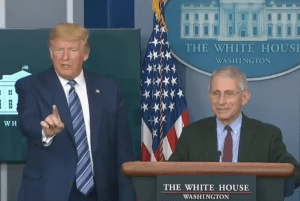Trump refuses to let his own medical expert address unproven 'treatment'
Donald Trump continues to promote an unproven drug to treat COVID-19 against the advice of medical experts.

Donald Trump on Sunday refused to allow Dr. Anthony Fauci, the nation’s top infectious disease expert, to answer a reporter’s question about hydroxychloroquine, an anti-malarial drug Trump continues to promote as a possible cure for COVID-19, the disease caused by the new coronavirus at the center of a global pandemic.
At a press conference at the White House, Trump promoted the unproven drug as a possible cure, saying, “There are some very strong, powerful signs” that it could be helpful.
“But what do I know? I’m not a doctor,” Trump added.
When a reporter asked Fauci, who is a doctor, to weigh in, Trump interrupted.
“You know how many times he has answered that question?” Trump asked the reporter. “Maybe 15 times. You don’t have to ask the question.”
“He’s your medical expert, correct?” the reporter asked Trump.
“He’s answered that question 15 times,” Trump reiterated, refusing to allow Fauci to respond.
On March 19, Fauci answered a question from a reporter on the topic of hydroxychloroquine, stating there was no evidence it could be helpful in the coronavirus pandemic.
“The information that you’re referring to specifically is anecdotal,” Fauci said. “It was not done in a controlled clinical trial. So you really can’t make any definitive statement about it.”
Trump has been touting the drug for weeks.
“HYDROXYCHLOROQUINE & AZITHROMYCIN, taken together, have a real chance to be one of the biggest game changers in the history of medicine,” Trump tweeted on March 21. He has spoken about hydroxychloroquine at several press conferences since then.
Shortly after Trump’s initial promotion of hydroxychloroquine, major medical associations both in the United States and abroad warned against promoting its use to treat COVID-19.
“We caution hospitals, health systems, and individual practitioners that no medication has been FDA-approved for use in COVID-19 patients, and there is no incontrovertible evidence to support off-label use of medications for COVID-19,” the American Medical Association, the American Pharmacists Association, and the American Society of Health-System Pharmacists said in a March 25 joint statement.
The organizations specifically warned against hospitals stockpiling the drug in anticipation of prescribing it for COVID-19 patients, in part because the drug is prescribed and required for use in patients with other conditions, “such as lupus or rheumatoid arthritis if the drugs are not available in the community.”
The World Health Organization has also weighed in on the topic.
“Using untested medicines without the right evidence could raise false hope and even do more harm than good,” Tedros Adhanom Ghebreyesus, the group’s director-general, said on March 23.
In March, an Arizona man died and his wife was hospitalized after ingesting chloroquine phosphate, an additive used in fish tank cleaner.
“We saw Trump on TV — every channel — and all of his buddies and that this was safe,” the woman told NBC News. “Trump kept saying it was basically pretty much a cure.”
Published with permission of The American Independent Foundation.
Recommended

Ohio doctors fear effects of emergency abortion care case set to go before U.S. Supreme Court
A federal law that allows emergency departments to treat patients without regard to their ability to pay will be under U.S. Supreme Court scrutiny this week, and Ohio doctors are concerned about the case’s local impact on emergency abortion care.
By Susan Tebben, Ohio Capital Journal - April 23, 2024
House GOP votes to end flu, whooping cough vaccine rules for foster and adoptive families
A bill to eliminate flu and whooping cough vaccine requirements for adoptive and foster families caring for babies and medically fragile kids is heading to the governor’s desk.
By Anita Wadhwani, Tennessee Lookout - March 26, 2024
U.S. House Speaker Johnson says IVF should be protected — just not by Congress
U.S. House Speaker Mike Johnson said Thursday that it’s up to states and not Congress to preserve access to in vitro fertilization, weighing in on a growing national debate and campaign issue.
By Jennifer Shutt, States Newsroom - March 14, 2024








































































